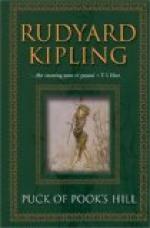’He laughed and he cried with joy, because he had been released at last, and could go away. But he was an honest Old Thing. He had worked for his living and he paid his debts before he left. “I shall give that novice a gift,” said Weland. “A gift that shall do him good the wide world over and Old England after him. Blow up my fire, Old Thing, while I get the iron for my last task.” Then he made a sword—a dark-grey, wavy-lined sword—and I blew the fire while he hammered. By Oak, Ash and Thorn, I tell you, Weland was a Smith of the Gods! He cooled that sword in running water twice, and the third time he cooled it in the evening dew, and he laid it out in the moonlight and said Runes (that’s charms) over it, and he carved Runes of Prophecy on the blade. “Old Thing,” he said to me, wiping his forehead, “this is the best blade that Weland ever made. Even the user will never know how good it is. Come to the monastery.”
’We went to the dormitory where the monks slept, we saw the novice fast asleep in his cot, and Weland put the sword into his hand, and I remember the young fellow gripped it in his sleep. Then Weland strode as far as he dared into the Chapel and threw down all his shoeing-tools—his hammers and pincers and rasps—to show that he had done with them for ever. It sounded like suits of armour falling, and the sleepy monks ran in, for they thought the monastery had been attacked by the French. The novice came first of all, waving his new sword and shouting Saxon battle-cries. When they saw the shoeing-tools they were very bewildered, till the novice asked leave to speak, and told what he had done to the farmer, and what he had said to Wayland-Smith, and how, though the dormitory light was burning, he had found the wonderful rune-carved sword in his cot.
’The Abbot shook his head at first, and then he laughed and said to the novice: “Son Hugh, it needed no sign from a heathen God to show me that you will never be a monk. Take your sword, and keep your sword, and go with your sword, and be as gentle as you are strong and courteous. We will hang up the Smith’s tools before the Altar,” he said, “because, whatever the Smith of the Gods may have been, in the old days, we know that he worked honestly for his living and made gifts to Mother Church.” Then they went to bed again, all except the novice, and he sat up in the garth playing with his sword. Then Weland said to me by the stables: “Farewell, Old Thing; you had the right of it. You saw me come to England, and you see me go. Farewell!”
’With that he strode down the hill to the corner of the Great Woods—Woods Corner, you call it now—to the very place where he had first landed—and I heard him moving through the thickets towards Horsebridge for a little, and then he was gone. That was how it happened. I saw it.’
Both children drew a long breath.
‘But what happened to Hugh the novice?’ said Una.
‘And the sword?’ said Dan.




